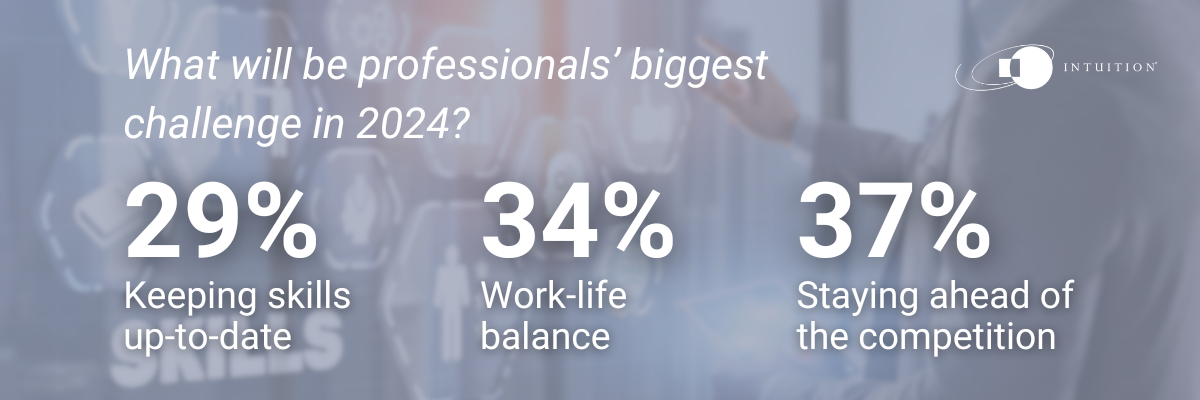What will be professionals’ biggest challenge in 2024?
Throughout 2023, Intuition launched a series of polls to our online audience. We asked various questions on different topics such as learning strategy and learning preferences. In this article, we focus on professionals biggest challenges in 2024.
In the below poll, we asked the question:

Professionals’ biggest challenge: The importance of keeping skills up-to-date
In an era of constant technological advancements and evolving industry trends, one of professionals’s biggest challenges will be keeping skills up-to-date, which has become a critical priority for professionals across sectors. With 29% of respondents identifying this as their primary challenge, it is clear that individuals recognize the need to continuously learn and adapt to remain relevant in their roles.
Adapting to technological advancements
Advances in technology are transforming the way we work, demanding that professionals acquire new skills to leverage emerging tools and systems effectively. Automation, artificial intelligence, and data analytics are revolutionizing industries, making it imperative for professionals to stay abreast of these developments. By staying updated on the latest technologies and embracing digital transformation, professionals can enhance their productivity, efficiency, and overall effectiveness.
Navigating industry changes
Industries are constantly evolving, with new processes, regulations, and market dynamics shaping the way businesses operate. To thrive in such an environment, professionals must proactively seek opportunities to expand their knowledge and skills. This could involve attending industry conferences, participating in webinars, or pursuing relevant certifications. By staying informed about industry trends and best practices, professionals can position themselves as valuable assets within their organizations.
Professionals’ biggest challenge: Balancing work-life demands
Achieving a healthy work-life balance is one of professionals’ biggest challenges this year. With 34% of respondents citing work-life balance as their primary concern, it is evident that individuals are seeking strategies to harmonize their personal and professional lives effectively.
Setting boundaries and prioritizing
Establishing clear boundaries between work and personal life is essential to maintain a healthy balance. Professionals should define specific working hours and dedicate time to personal pursuits, family, and self-care. By setting priorities and effectively managing their time, individuals can ensure that work commitments do not encroach upon their personal lives, reducing stress and promoting overall well-being.
Embracing flexible work arrangements
The rise of remote work and flexible schedules has provided professionals with newfound opportunities to achieve a better work-life balance. By leveraging these arrangements, individuals can tailor their work schedules to suit their personal needs, whether it is caring for family members, pursuing hobbies, or maintaining a healthy lifestyle. Embracing flexible work options can enhance job satisfaction, productivity, and overall happiness.

Professionals’ biggest challenge: Staying ahead of the competition
In a competitive job market, professionals must continually strive to stay ahead and differentiate themselves from their peers. With 37% of respondents recognizing the need to outperform their competition, it is clear that individuals are seeking strategies to stand out from their peers and secure their professional success.
Continuous learning and skill development
To remain competitive, professionals must adopt a growth mindset and embrace continuous learning. This involves actively seeking opportunities to acquire new skills, expand their knowledge base, and stay updated on industry trends. Engaging in professional development activities, such as attending workshops, pursuing advanced degrees, or participating in online courses, can give professionals a competitive edge and demonstrate their commitment to personal and professional growth.
Building a strong professional network
Networking plays a crucial role in professional success, providing opportunities for collaboration, mentorship, and career advancement. Building a strong professional network involves actively engaging with colleagues, attending industry events, and leveraging social media platforms like LinkedIn. By fostering meaningful connections, professionals can tap into a diverse pool of resources, gain valuable insights, and open doors to new opportunities.
Summary
- As we look ahead to 2024, professionals face significant challenges in keeping their skills up-to-date, achieving work-life balance, and staying ahead of the competition.
- By recognizing the importance of continuous learning, embracing flexible work arrangements, and investing in professional growth, individuals can navigate these challenges effectively.


